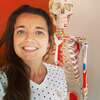Polycystic ovary syndrome (PCOS) and osteopathy
Did you know that?
1 in 10 women suffer from polycystic ovary syndrome
It is the 1st cause of female infertility
What is polycystic ovary syndrome?
The name polycystic ovary syndrome is actually a misnomer. When the disease was first described in the 1930s, researchers thought that patients had cysts in their ovaries. In reality, these are not cysts but a large / too large number of follicles that do not develop. This condition should therefore be called multi-follicular ovarian syndrome.
Polycystic ovary syndrome (PCOS) is caused by a hormonal disorder that can be of central origin (in the brain such as the hypothalamus or pituitary gland) or local with an ovarian origin.
In this pathology, there is an elevated level of androgenic hormones and more particularly of testosterone.
PCOS symptoms
The symptoms vary greatly from one woman to another and even from one period of life to another.
However, the following list of symptoms are common:
- Ovulation disorder: The woman has irregular cycles that are often long (35 to 40 days against an average of 28) and can even go as far as the absence of menstruation (we speak of amenorrhea). This results in an absence or less frequent ovulation, which is the cause of infertility.
- Infertility: about 50% of women with PCOS experience infertility
- Hyperandrogenism disorder : the high level of testosterone causes:
- Hyperpilosity: 70% of women with PCOS are affected
- Acne
- Hair loss : we talk about alopecia
- Adipocity: increase in fat and therefore in the body mass index
- Other associated pathologies hyperandrogenism predisposes to certain pathologies:
- Diabetes
- Insulin resistance
- High blood pressure
- Cardiovascular pathologies
Complementary tests to be done in case of suspicion of polycystic ovary syndrome
Pelvic ultrasound
Pelvic ultrasound reveals a high number of small follicles: at least 20 as opposed to 5 to 10 per ovary in normal circumstances with a size < 9mm in diameter and/or a large volume of the ovary (greater than 10 ml).
Biological check-up (blood test)
Between the 2nd and 5th day of the cycle, a blood sample is taken:
- FSH assay
- LH assay
- TSH
- Prolactin
- Testosterone
- Blood glucose
- Insulin levels
- Delta 4 androstenedione
- SDHA
- 17 hydroxy progesterone
- 17 beta-oestradiol
Note: If the patient is not menstruating, the patient is given a progesterone-based treatment for 10 days.
The biological abnormalities found in polycystic ovary syndrome are:
- High levels of androgens
- Inversion of the FSH / LH ratio: In the majority of women suffering from PCOS, the baseline LH level is too high compared to normal. Moreover, it does not increase in the middle of the cycle. It is its increase, its peak that would trigger ovulation...
- Tendency to hyperinsulinemia
- Tendency to diabetes
Causes of PCOS
The hormonal imbalance is the cause but the cause of this imbalance is often unknown... Some causes have been highlighted:
- Genetics: certain genes have been identified as predisposing to this syndrome. The family history increases the risk of 30% for the descendants.
- Endocrine disruptors
Treatment of polycystic ovary syndrome
There is no real cure for PCOS. Treatment consists of treating the symptoms, such as medication for hirsutism (excessive hair growth) or hormone treatments for infertility.
However, it is advisable to:
- Have a healthy lifestyle
- Ketogenic protocol: eliminate or at least drastically reduce sugar from your diet
- Have a psychological support
- Avoid being overweight, which significantly increases the signs of androgenism
Osteopathy and PCOS
Osteopathy does not directly treat polycystic ovary syndrome, we would love to!
But in the same way as medication, osteopathy helps to relieve the symptoms by working on the area to release the tensions but also at a distance. By taking care of the body in its entirety, and by accompanying the patient (explanations of the pathology, of the treatment, etc.), osteopathy proves its worth with PCOS patients.
Do not hesitate to ask your osteopath questions and to consult an osteopath who has specialised in gynaecology.
Marie Messager
Osteopath D.O
2 rue Alexis de Tocqueville
78000 Versailles

